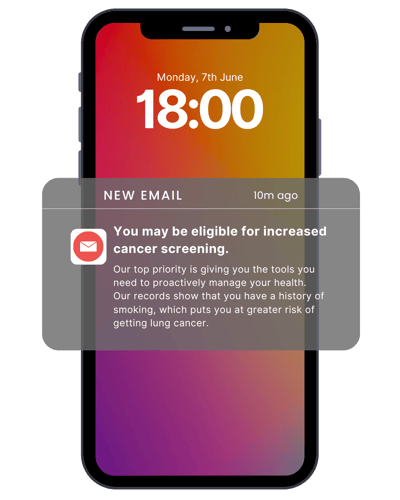Gynecologic Cancer Awareness Month (September), Breast Cancer Awareness Month (October) and Lung Cancer Awareness Month (November) are around the corner.
As your health system considers how to educate and engage patients this year, consider a novel approach: campaign-based risk assessment — which goes beyond the clinic by sending tailored outreach to a targeted group of patients or community members based on their unique risk factors to encourage them to complete a risk assessment before they even step foot in a clinic or hospital.
This approach helped Nebraska Medicine identify nearly 300 people eligible for lung cancer screening — and four patients with early-stage lung cancer — in just two months.
Supported by CancerIQ, Nebraska Medicine created and ran a lung cancer prevention campaign focused on cancer risk assessment outside of the clinic. Rachael Schmidt, Nebraska Medicine’s Program Director for Cancer Survivorship & Cancer Risk and Prevention, shared the process and impact of their campaign and how your health system can achieve the same success—in a recent CancerIQ webinar.
Watch the full webinar here.
Rachael didn’t let barriers like an at-capacity IT team, EHR limitations or lack of team bandwidth to activate and manage at-risk patients stop her team from identifying patients eligible for a low-dose CT lung scan. Instead, they partnered with CancerIQ to capture comprehensive cancer risk information outside the clinic, as well as provide patients with tailored education from certified genetic counselors and an action plan to discuss with their doctors. It can also help providers and patients manage their precision prevention plans over time.
With our support and services, Nebraska Medicine reached patients who had a recorded history of smoking with tailored messaging to complete CancerIQ’s cancer risk assessment in their own space, on their own time.

Of the 3,500 patients who received a portal message, email, or flier in the mail as part of that program:
- 1,030 completed a survey — a 29% response rate, compared to 5% to 6% for previous programs
- 298 were deemed eligible for a low-dose CT scan and a shared decision-making appointment
- 4 were diagnosed with Stage 1A lung cancer
Every patient who completed the survey experienced an improved clinical outcome. That includes the patients diagnosed with early-stage cancer, as the five-year survival rate for Stage 1 lung cancer is 11 times greater than that of Stage 4. And, for the health system, every one of those patients came in the door for a billable preventive care service.
With CancerIQ’s technology and patient marketing toolkits, your health system can also stand up and execute a campaign-based risk assessment plan in time for fall’s awareness months without significant lift from your internal teams.
If you want to reach the right patients during Breast Cancer Awareness Month and Lung Cancer Awareness Month—and if you want to get them in the door for a mammogram, MRI or low-dose CT scan that could change the course of their lives—CancerIQ is here to help you make it happen.
Connect with our team today to learn how to get started before October!
